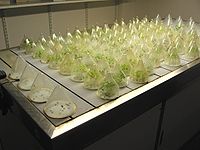Plant physiology

Plant physiology is the study of how plants work and grow. Plants are living organisms, just like people and animals, but they are different in many ways. Plants get their food through photosynthesis, which is the process of turning sunlight into energy.
Plants have a lot of parts, and each part plays an important role in how they work. The leaves, for example, are where photosynthesis happens. They are green because of a pigment called chlorophyll, which helps in trapping sunlight. The stem is like the backbone of the plant, and it helps to support it and transport water and nutrients.
The roots are the part of the plant that are underground. They help to anchor the plant and absorb water and minerals from the soil. Roots have small hairs on them, which increase their surface area and help them absorb more water and nutrients.
Plants need water, nutrients, and sunlight to grow. They use their roots to take in water and minerals from the soil. They use their leaves to absorb sunlight and carbon dioxide from the air. Through photosynthesis, they turn these things into energy and oxygen.
Plants can sense changes in their environment. For example, they can tell if it's getting cold or if there is a shortage of water. They also have ways of defending themselves from pests and diseases.
Different types of plants grow in different ways. Some are tall and skinny, while others are short and bushy. Some plants live for a very long time, while others only live for a few months.
Overall, plant physiology is the study of how plants work and how they interact with their environment. By understanding how plants grow and develop, we can learn more about the world around us and how we can use plants to help us.
Plants have a lot of parts, and each part plays an important role in how they work. The leaves, for example, are where photosynthesis happens. They are green because of a pigment called chlorophyll, which helps in trapping sunlight. The stem is like the backbone of the plant, and it helps to support it and transport water and nutrients.
The roots are the part of the plant that are underground. They help to anchor the plant and absorb water and minerals from the soil. Roots have small hairs on them, which increase their surface area and help them absorb more water and nutrients.
Plants need water, nutrients, and sunlight to grow. They use their roots to take in water and minerals from the soil. They use their leaves to absorb sunlight and carbon dioxide from the air. Through photosynthesis, they turn these things into energy and oxygen.
Plants can sense changes in their environment. For example, they can tell if it's getting cold or if there is a shortage of water. They also have ways of defending themselves from pests and diseases.
Different types of plants grow in different ways. Some are tall and skinny, while others are short and bushy. Some plants live for a very long time, while others only live for a few months.
Overall, plant physiology is the study of how plants work and how they interact with their environment. By understanding how plants grow and develop, we can learn more about the world around us and how we can use plants to help us.
Related topics others have asked about:
